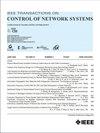Control of Multiagent Networks With Misbehaving Nodes Over Directed Graph Topologies
IF 4
3区 计算机科学
Q2 AUTOMATION & CONTROL SYSTEMS
引用次数: 0
Abstract
In this article, we study multiagent networks over directed graph topologies involving nodes subject to exogenous disturbances (i.e., misbehaving nodes) and nodes that receive feedback control signals (i.e., driver nodes) for the purpose of suppressing the adverse effects of misbehaving nodes. The number of driver nodes can be less than the total number of nodes in the multiagent network. Specifically, we propose proportional–integral feedback controllers to be executed by driver nodes. These controllers guarantee the stability of the overall multiagent network in the sense of input-to-state stability (i.e., they make the resulting closed-loop system matrix Hurwitz). Furthermore, we utilize a graph-theoretical approach that allows users to find the steady-state values of critical nodes without requiring the knowledge of the Laplacian matrix of the overall multiagent network. The results presented in this article pave the way for understanding how driver nodes need to be selected to suppress the effect of misbehaving nodes on the neighborhood of critical nodes, which is further illustrated through illustrative numerical examples.有向图拓扑上具有不良行为节点的多智能体网络控制
在本文中,我们研究了有向图拓扑上的多智能体网络,涉及受外生干扰的节点(即行为不端的节点)和接收反馈控制信号的节点(即驱动节点),目的是抑制行为不端的节点的不利影响。驱动节点的数量可以小于多代理网络中的节点总数。具体来说,我们提出了由驱动节点执行的比例积分反馈控制器。这些控制器保证了整个多智能体网络在输入到状态稳定性意义上的稳定性(即,它们使得到的闭环系统矩阵Hurwitz)。此外,我们利用图理论方法,允许用户在不需要了解整个多智能体网络的拉普拉斯矩阵的情况下找到关键节点的稳态值。本文给出的结果为理解如何选择驱动节点来抑制不良行为节点对关键节点邻域的影响铺平了道路,并通过举例说明进一步说明了这一点。
本文章由计算机程序翻译,如有差异,请以英文原文为准。
求助全文
约1分钟内获得全文
求助全文
来源期刊

IEEE Transactions on Control of Network Systems
Mathematics-Control and Optimization
CiteScore
7.80
自引率
7.10%
发文量
169
期刊介绍:
The IEEE Transactions on Control of Network Systems is committed to the timely publication of high-impact papers at the intersection of control systems and network science. In particular, the journal addresses research on the analysis, design and implementation of networked control systems, as well as control over networks. Relevant work includes the full spectrum from basic research on control systems to the design of engineering solutions for automatic control of, and over, networks. The topics covered by this journal include: Coordinated control and estimation over networks, Control and computation over sensor networks, Control under communication constraints, Control and performance analysis issues that arise in the dynamics of networks used in application areas such as communications, computers, transportation, manufacturing, Web ranking and aggregation, social networks, biology, power systems, economics, Synchronization of activities across a controlled network, Stability analysis of controlled networks, Analysis of networks as hybrid dynamical systems.
 求助内容:
求助内容: 应助结果提醒方式:
应助结果提醒方式:


